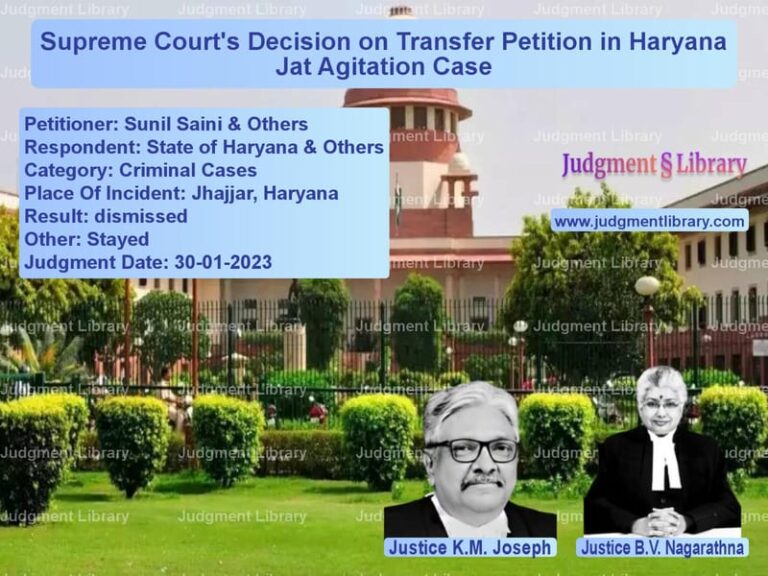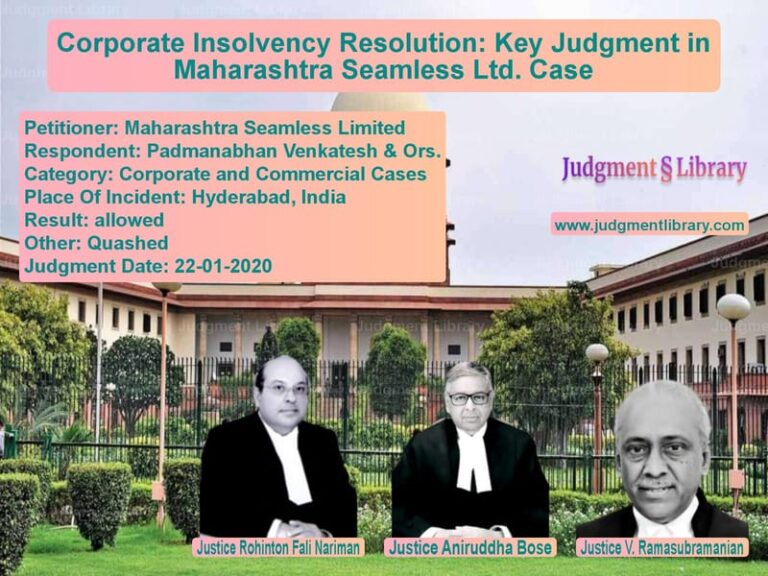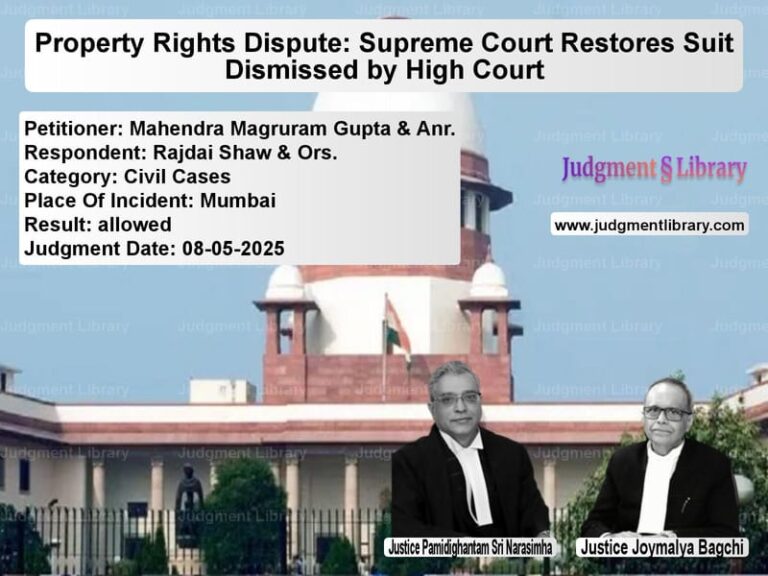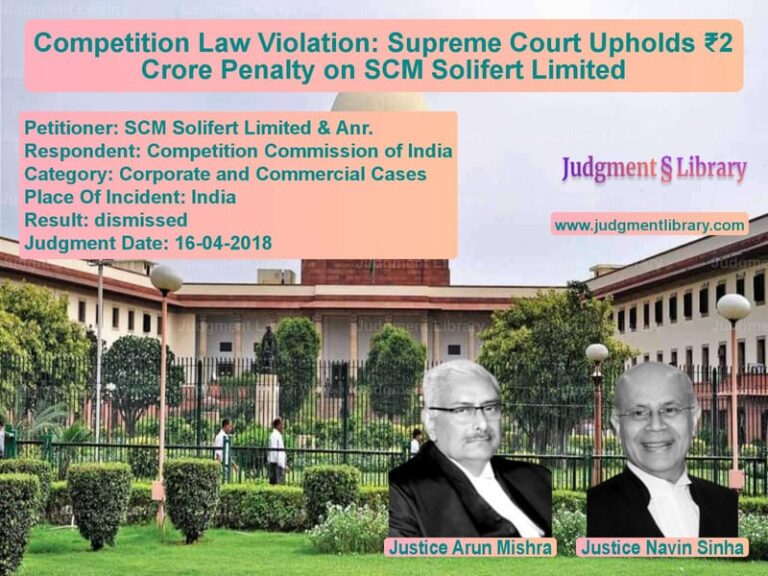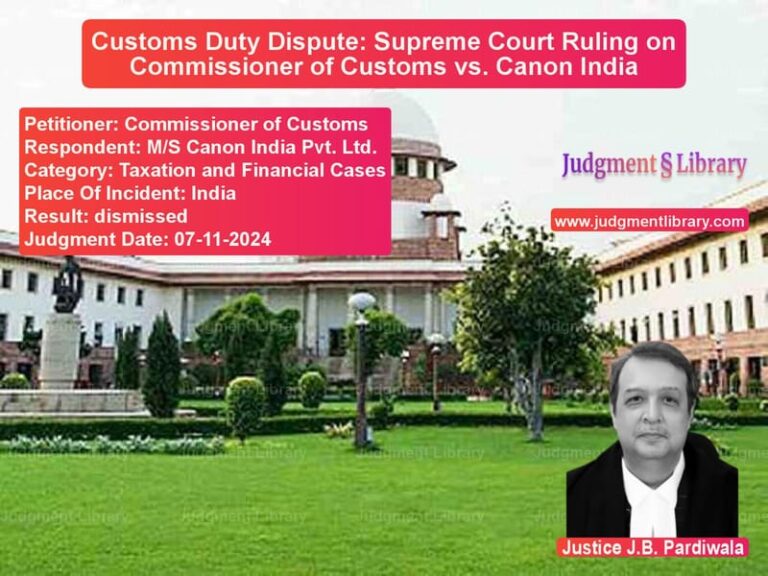Contempt Petition in Pension and Service Benefits Case: Supreme Court Clarifies Employee Rights
The case of K. Ananda Rao v. Sri S.S. Rawat, IAS & Ors. deals with a critical issue of service benefits and pension rights of employees following the bifurcation of Andhra Pradesh. The case originated from a dispute over whether employees of institutions listed in Schedules IX and X of the Andhra Pradesh Reorganization Act, 2014, were entitled to have their retirement age increased from 58 to 60 years.
The Supreme Court’s judgment dated March 7, 2019, addressed contempt petitions alleging non-compliance with the earlier ruling of August 9, 2017. The petitioners sought reinstatement and full salary benefits for the period they were out of service due to retirement at 58, arguing that the state had failed to implement the previous court order.
Case Background
The petitioners were employees of the Andhra Pradesh Tribal Welfare Residential Educational Institution Society (Gurukulam) and other public institutions listed under the Andhra Pradesh Reorganization Act, 2014. The Andhra Pradesh government had initially raised the retirement age from 58 to 60 for government employees through an amendment to the Andhra Pradesh Public Employment (Regulation of Age of Superannuation) Act, 1984.
However, employees of various government-run institutions, including Gurukulam, were initially excluded from this benefit. Several resolutions and government orders (GOs) created confusion over whether the enhanced retirement age applied to them.
In its judgment dated August 9, 2017, the Supreme Court ruled that these employees were entitled to continue in service up to 60 years and directed their reinstatement with all consequential benefits. However, despite this ruling, disputes arose over the scope of “consequential benefits.”
Petitioner’s Arguments
The petitioners, represented by Senior Advocate P.S. Patwalia, argued that:
- The state had failed to fully implement the Supreme Court’s directive, particularly regarding back wages.
- The court’s previous order clearly granted reinstatement and all consequential benefits, which must include full salary and emoluments for the period when employees were out of service.
- The state’s selective implementation of the order was unjust, depriving the employees of financial benefits they were entitled to.
- Reliance was placed on the case of B. Prabhakar Rao v. State of Andhra Pradesh, where the court had granted full financial benefits to reinstated employees.
Respondent’s Arguments
The state, represented by Senior Advocates Basava Prabhu S. Patil and Parag P. Tripathi, contended that:
- The Supreme Court’s previous order did not explicitly mandate payment of back wages.
- The term “consequential benefits” should not be interpreted to include salaries for the period employees had not actually worked.
- The government had complied with the order by reinstating employees and adjusting their retirement age.
- Financial constraints and administrative complications justified the denial of full back wages.
- The policy governing pension and retirement benefits was clearly outlined in previous government orders and did not support back wages.
Supreme Court’s Analysis and Ruling
The Court upheld the state’s position and ruled that:
“Unless and until that governing criteria was departed from specifically, mere expression ‘consequential benefits’ would not entitle the concerned employees anything greater than what was contemplated in the policy documents issued by the State Government.”
The Court observed that while the previous ruling protected employees’ rights, it did not explicitly grant back wages. It held:
“The order dated 09.08.2017 does not indicate that any such aspect of the matter was in contemplation of this Court or the matter was addressed from this standpoint.”
The Court rejected the reliance on B. Prabhakar Rao, distinguishing it from the present case on the ground that the former involved a broader policy change, whereas this case involved service benefits following state bifurcation.
The Court also referred to Sureshchandra Singh v. Fertilizer Corporation of India Ltd., which held that extending retirement age to PSU employees was subject to financial and administrative feasibility.
In conclusion, the Court ruled:
“We, therefore, do not find any violation of the orders passed by this Court and dismiss these contempt petitions. It goes without saying that every employee, who is similarly situated, would be entitled to the benefits conferred by policy documents referred to above but not for salary and other emoluments for the period they had not actually worked.”
Conclusion
The Supreme Court’s ruling clarified the scope of service benefits for employees impacted by the bifurcation of Andhra Pradesh. While it upheld the reinstatement of employees and extension of retirement age, it denied back wages, reinforcing the principle that financial entitlements must align with government policies.
Petitioner Name: K. Ananda Rao & Ors..Respondent Name: Sri S.S. Rawat, IAS & Ors..Judgment By: Justice Uday Umesh Lalit, Justice M.R. Shah.Place Of Incident: Andhra Pradesh.Judgment Date: 07-03-2019.
Don’t miss out on the full details! Download the complete judgment in PDF format below and gain valuable insights instantly!
Download Judgment: K. Ananda Rao & Ors. vs Sri S.S. Rawat, IAS Supreme Court of India Judgment Dated 07-03-2019.pdf
Direct Downlaod Judgment: Direct downlaod this Judgment
See all petitions in Pension and Gratuity
See all petitions in Employment Disputes
See all petitions in Termination Cases
See all petitions in Public Sector Employees
See all petitions in Judgment by Uday Umesh Lalit
See all petitions in Judgment by Mukeshkumar Rasikbhai Shah
See all petitions in dismissed
See all petitions in supreme court of India judgments March 2019
See all petitions in 2019 judgments
See all posts in Service Matters Category
See all allowed petitions in Service Matters Category
See all Dismissed petitions in Service Matters Category
See all partially allowed petitions in Service Matters Category


